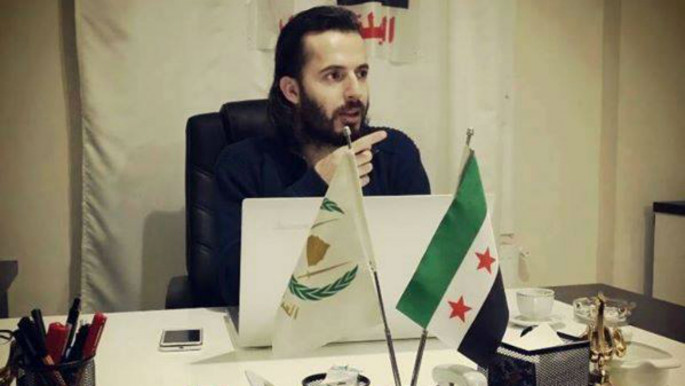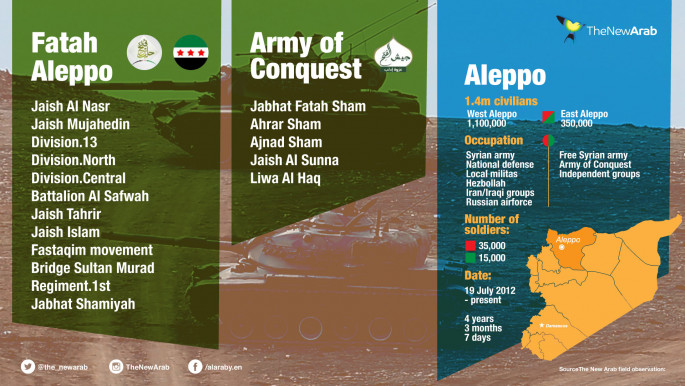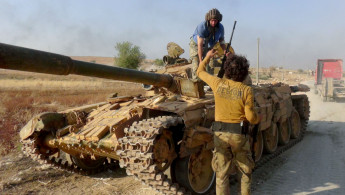Syrian rebels prepare 'Mother of all Battles' for Aleppo
Thousands of fighters from a range of militias are heading north from the rebel's stronghold in Idlib ready to take part in the assault.
Dozens of vehicles have been converted into suicide VBIEDs or car bombs to pave way for the first phase of the attack by 600 specially trained "storm troopers".
If they are successful and break the regime's siege of east Aleppo, they could well rout the regime from the whole city, and secure northern Syria for the opposition.
If they fail, Aleppo will almost certainly fall into the regime's hands and the future for the Syrian opposition will look very bleak indeed.
"The fight for Aleppo will be the final battle," one rebel fighter told The New Arab.
Unity
A joint military command centre - Ahl al-Sham [People of Syria] - has been set up, and it includes no fewer than five factions, including the Free Syrian Army, Nour al-Deen al-Zinki, and Jaish al-Fatah.
 |
Members of the opposition say the myriad of rebel groups - secular, Islamist and jihadi - have finally found common ground, and fighters are "without exception" eager to take part in the offensive.
"All factions within the Fatah Aleppo operation room agreed to participate as much as possible. They will commit all their resources, heavy weapons and all other available means to succeed with the general goals," said Ibrahim al-Idlibi, a media spokesperson for the Free Syrian Army's 21st Combined Force, formerly known as the 101 Division.
"Jaish al-Fatah has enough manpower to continue with the push, even after we break the [siege of Aleppo]," he said.
The offensive was temporarily put on hold, after the Syrian regime captured a strategic hilltop in Aleppo, but the opposition insist the attack will still go ahead in the coming days or weeks.
If the last-ditch attempt to secure East Aleppo is successful, it will secure critical supply routes into the city.
Critically, it would limit the regime's ability to launch counter-attacks on East Aleppo, and from this stronghold the rebels could move into regime-held West Aleppo.
Capital of commerce
Damascus might be the capital of Syria, but pre-war Aleppo had the larger population and was the country's industrial and economic hub, although war has undoubtedly changed this situation.
 |
| Ibrahim al-Idlibi [@BosnjoBoy] |
Aside from the prestige of capturing Aleppo - its location close to the Turkish border and inroads into other parts of Syria also make it an important prize for both sides.
In August, after the regime laid siege to east Aleppo, the rebels launched an offensive to break the blockade.
It began with civilians making their own "no-fly-zone" by burning hundreds of tires to create a thick blanket of smoke shielding the build-up of fighters, and preventing further bombing of residential areas.
Then the offensive began with thousands of rebels breaking the siege - albeit briefly.
Mohammed Rashed, an officer and head of the media office of Jaish al-Nasr, a Free Syrian Army faction in Aleppo, said that the new offensive would rely on coordination across the board if it is to be successful.
"What I can tell you is that civilians within the districts will play a key role, a factor which will help us during our movements," Rashed said.
"The offensive will work simultaneously in several directions. The start is expected in the west, from where the rebels should push into three different parts of Aleppo, the west, south and another 'surprise' direction."
The thin corridor of land into east Aleppo secured by the rebels during the August offensive - around the al-Ramousa district - proved unsustainable to hold. Vulnerable to attack from two sides, it fell again to the regime within days.
No way back
President Bashar al-Assad has made it clear he won't accept a long-term truce with the rebels, and ultimately wants to defeat the opposition on the battlefield.
Aleppo appears to be the theatre in which Damascus wants to deliver a decisive blow to the rebels.
East Aleppo has been largely flattened by waves of Russian and regime air raids since a ceasefire broke down in September. More than 1,000 people - mostly civilians - have been killed in the past two months of bombing.
|
|||
| Syrian rebels have prepared vehicles packed full of explosives for the initial stages of the attack Translation: "We are ready to greet the 'green buses' and it will be a good meeting, God willing" |
Meanwhile, a regime offer of "reconciliation" for civilians has been rejected - with only a handful of East Aleppo's 300,000 civilians leaving the district through "humanitarian corridors".
At the same time, regime-aligned fighters have launched another offensive and moved deeper into eastern Aleppo.
"The goal is clear, our people in Aleppo are suffering and we are their only hope," said Rashed.
"Aleppo will be reopened, but our struggle continues everywhere the Assad regime is present."
Rashed said the first wave of attacks in the Aleppo offensive would include 4,000 men, and will allow them to link up with around 10,000 rebels inside east Aleppo.
It will combine a wave of suicide attacks from the Fatah al-Sham vanguard, while opposition engineers will detonate five massive underground "torpedo" bombs buried under the city.
The opposition hope to replicate their lightning attack on Idlib province in 2015, when they captured the provincial capital and then moved into other areas such as Jisr al-Shighour. The surprise offensive gave the Syrian opposition full control over the first Syrian province.
That was an assault which took six months to plan; the opposition have a much shorter timeframe to coordinate attacks to retake Aleppo.
Another challenge is that while the Jaish al-Fatah-led offensive in Idlib was made up of similarly ideologicallyaligned groups, the Aleppo offensive will rely on secular FSA and Salafi commanders working together.
If they fail now, the wounds from the defeat will take a long time to heal. Many agree that east Aleppo will likely face the same fate as many other places in Syria that resisted sieges - in the end, most yielded to the pressure.
| Who's involved? |
 |



